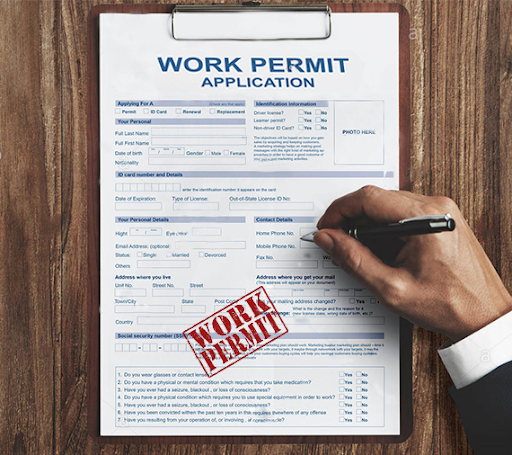The Kenya Work Permit is an authorization document issued by the immigration department allowing foreign nationals to legally work in the country. Obtaining a valid work permit is mandatory for non-citizens taking up employment, establishing a business or practising a profession in Kenya.

The permit regulates the labour market, protects local jobs and ensures foreigners are employed in areas where their skills are needed. Companies hiring expatriates must facilitate work permits for their employees. These permits are tied to a specific job with a particular employer and are issued for a defined duration. Understanding Kenya's work permit requirements and process is crucial for foreigners and employers to avoid violations and penalties.
Significance of Work Permits in Kenya
In recent years, Kenya has introduced stringent immigration laws mandating foreign individuals to acquire work permits and Kenya visas for engaging in employment within its borders. These regulations encompass a range of requirements, from application processes to the controlled allocation of foreign workforce positions. Native companies are obliged to adhere to these policies, which can render the process of recruiting foreign personnel more intricate.
- Adherence to Immigration Laws
Kenya's implementation of strict immigration laws underscores its commitment to regulating the entry and employment of foreign workers. By necessitating work permits and visas, the country ensures that individuals who wish to contribute to its workforce do so in accordance with established legal guidelines. This approach maintains transparency and accountability in the labour market.
- Preference for Local Workforce
Kenya's emphasis on limiting the number of foreign employees demonstrates its dedication to prioritising its domestic workforce. These regulations are designed to strike a balance between the benefits of foreign expertise and the protection of local job opportunities. By imposing limitations on foreign workforce numbers, Kenya safeguards its citizens' access to employment.
- Challenges for Native Companies
Native companies operating in Kenya must navigate the intricacies of these regulations. The process of obtaining work permits for foreign employees involves complying with rigorous application procedures and demonstrating the necessity of hiring non-Kenyan personnel. This can make the process of establishing a foreign team a more time-consuming and meticulous endeavour.
- Essential Prerequisites for Legal Employment
For those seeking to work within Kenya's borders, obtaining an approved work permit and work visa is imperative. These documents serve as legal authorization to engage in employment activities. Adhering to this requirement ensures that foreign workers operate within the boundaries of the law and contributes to a well-structured labour ecosystem.

Kenya's Job Market
Although specific figures are not available, expatriates have a presence in Kenya's job market. This suggests that foreign individuals play a significant role in contributing to the country's economy through their employment.
Platforms like Jobnetafrica, learn4good, and Aetnainternational facilitate the search for employment opportunities by expatriates in Kenya. These websites serve as valuable resources for individuals seeking to explore job options in various industries.
- Preferred Industries for Expatriates
Expatriates are drawn to several industries within Kenya. Sectors such as Banking, Health Insurance, Travel Insurance, and Teaching English are particularly popular. These industries offer avenues for foreign professionals to apply their expertise and make meaningful contributions to Kenya's economic landscape.
The stringent work permit regulations in Kenya reflect the country's commitment to well-regulated workforce management and the protection of local employment opportunities. Navigating these regulations can pose challenges for native companies seeking to recruit foreign employees. Expatriates, meanwhile, find opportunities in various industries, highlighting the diversity and openness of Kenya's job market.
Diverse Types of Kenya Work Visas
Kenya offers a range of work visas tailored to different purposes. These visas cater to specific categories, including mineral prospecting, agriculture, specific employment roles, investment-related activities, missionary work, assured income from external sources, and assistance for conventional refugees. Each visa category aligns with distinct eligibility criteria, reflecting Kenya's commitment to a controlled and regulated workforce.

- Class A Visa: Mineral Prospecting and Mining
The Class A visa serves individuals with a keen interest in mineral prospecting or mining activities. This visa category allows foreign professionals to engage in exploration and extraction activities related to Kenya's mineral resources. This aligns with Kenya's efforts to harness its mineral wealth and expertise from abroad.
- Class B Visa: Investment in Agriculture or Animal Husbandry
Under the Class B visa, foreign individuals seeking to invest in Agriculture or Animal Husbandry can obtain legal authorization. This visa class supports Kenya's agricultural development by encouraging external investment, technology transfer, and expertise infusion in these crucial sectors.
- Class D Visa: Specific Employment Roles
Issued to individuals offered specific roles by qualified employers, the Class D visa facilitates targeted foreign employment. This category ensures that foreign professionals with specialised skills can take up positions where their expertise is genuinely required. This approach aims to address skill gaps in the local labour market.
- Class G Visa: Investors in Trade, Business, or Consultancy
The Class G visa is designed for foreign investors engaged in particular trades, businesses, or consultancy services within Kenya. This visa classification fosters international collaboration, knowledge exchange, and economic growth by encouraging external participation in various industries.
- Class I Visa: Missionary Society Members
Granted to members of missionary societies, the Class I visa signifies the harmonious intersection of faith-based activities and immigration regulations. This visa type underscores Kenya's respect for religious diversity and its commitment to facilitating the presence of individuals engaged in missionary work endorsed by the Government.
- Class K Visa: Income Assurance with Employment Restriction
The Class K visa provides a residence permit to foreign nationals who possess assured income derived from sources outside Kenya. Importantly, these individuals commit to refraining from accepting any form of paid employment within the country. This category accommodates those with self-sustaining resources while preserving local employment opportunities.
- Class M Visa: Work Permit for Conventional Refugees
The Class M visa is instrumental in addressing humanitarian needs. It allows conventional refugees, who have been displaced due to conflict or persecution, to engage in work within Kenya. This approach helps refugees support themselves while integrating into the local community.
Kenya's diverse array of work visa categories cater to a wide spectrum of purposes, from mineral exploration to investment, specialised employment, trade engagement, religious activities, income-assured residency, and support for refugees. Each category reflects the country's commitment to economic growth, skill enrichment, cultural understanding, and humanitarian concerns.
Requirements for a Kenya Work Permit
For individuals seeking a Class A visa, which pertains to mineral prospecting and mining, certain prerequisites must be met:
- Required Licences and Registrations: Prospective applicants must possess the necessary licences and registrations for engaging in mineral prospecting or mining activities. These documents validate their eligibility to participate in these sectors.
- Renewed Licence and PIN: Applicants are required to hold a renewed licence for mineral prospecting, along with providing a copy of their Personal Identification Number (PIN). This PIN serves as a unique identifier for tax and legal purposes.
Capital and Resources for Investment: Sufficient capital and resources must be demonstrated, affirming the applicant's ability to invest in and contribute to mineral-related endeavours.
- Class B Visa: Investment in Agriculture or Animal Husbandry
Individuals seeking a Class B visa, which caters to investment in Agriculture or Animal Husbandry, must meet specific conditions:
Proof of Land Ownership or Leasehold: Applicants should provide evidence of land ownership or a leasehold agreement for the purpose of engaging in agriculture or animal husbandry. This underscores the commitment to utilising resources for the intended economic activities.
Capital Evidence: Documentation substantiating the availability of capital for investment in the specified sectors is required. This demonstrates the applicant's financial capacity to contribute to agricultural and animal husbandry ventures.
Clearance from Authorised Bodies: Applicants need to obtain clearance from authorised regulatory bodies. This endorsement confirms that the proposed investment aligns with existing regulations and guidelines.
- Class D Visa: Specific Employment Roles
For the Class D visa, which is designed for individuals offered specific employment roles, the following criteria apply:
Academic or Professional Certificates: Applicants must submit copies of their academic or professional certificates along with their CV. These documents validate their qualifications and suitability for the offered position.
Evidence of Local Labor Shortage: The organisation hiring the applicant must provide evidence that local labour could not fulfil the vacant position. This underscores the need for foreign expertise to address skill gaps.
Form 25 Completion: Form 25, duly filled, signed, and sealed by the respective company, must be submitted. This form validates the company's acknowledgment and justification for hiring a foreign employee.
- Class G Visa: Investors in Trade, Business, or Consultancy
Applicants seeking the Class G visa, aimed at investors in trade, business, or consultancy, must fulfil the following prerequisites:
Documentary Proof of Capital: Applicants must provide documentary evidence of the capital intended for investment or already invested. A minimum of 100,000 US dollars or its equivalent in another currency is the threshold.
Company Registration Certificate: A certificate of company registration or incorporation is essential, confirming the legitimacy of the applicant's business activities.
Personal and Company PIN Copies: If the applicant is operating a business, copies of their personal and company Personal Identification Numbers (PINs) are required. These PINs facilitate tax compliance and legal identification.
Renewal Process for Class G Visa
For the renewal of the Class G visa, the following steps and requirements apply:
- Audited Accounts Submission: Applicants must provide audited accounts from the previous two years. This financial documentation validates the applicant's business activities and financial stability.
- Tax Compliance Certificate: A tax compliance certificate from the Revenue Authority is required. This certificate confirms the applicant's adherence to tax obligations and regulatory compliance.
In essence, the diverse categories of work visas in Kenya come with distinct sets of prerequisites. These requirements reflect Kenya's commitment to attracting foreign investment, addressing local labour shortages, and ensuring that skilled foreign professionals contribute positively to the nation's economic growth.
Kenya Work Permit Application Process
The Kenya Work Permit application involves a series of steps that applicants must follow to legally work within the country. This process encompasses submitting an application, committee evaluation, and eventual endorsement, ensuring that individuals meet the necessary requirements. The application duration can take several months, during which factors like economic impact, job creation, and applicant's origin are considered.
- Step 1: Submission of Work Permit Application
Foreign individuals interested in working in Kenya must initiate the process by applying for a Kenyan work permit. The specific visa classes are allocated based on the applicant's unique circumstances. The approval likelihood of the work permit hinges on whether the requisite skills for the designated position are locally available. Employers are required to substantiate their decision to hire a foreign national over a local candidate.
- Step 2: Application Review and Committee Approval
Once the application is submitted, it undergoes a review by the Ministry of Immigration. The application is then presented before a committee responsible for granting approval. This part of the process may take a minimum of 2 to 6 months, during which the committee evaluates the application's merits and adherence to regulations.
- Step 3: Committee Evaluation Factors
Several crucial factors are assessed by the committee when determining whether to approve or reject an application:
Impact on the Kenyan Economy: The committee assesses the amount of money to be invested and its potential economic impact. This evaluation is informed by auditor's reports and bank statements, ensuring the proposed investment aligns with Kenya's economic growth goals.
Job Creation for Kenyan Citizens: The application letter submitted by the applicant's agent highlights the projected number of jobs that will be created for Kenyan citizens. This factor underscores the commitment to local employment generation.
Country of Origin's Economic Standing and Criminal Statistics: The applicant's chances of approval are influenced if they originate from a country with a more robust economy than Kenya. Additionally, a low incidence of criminal statistics enhances the applicant's prospects.
- Step 4: Notification of Approval or Rejection
Should the application meet the aforementioned criteria and receive approval from the committee, the Ministry of Immigration issues a Notification of Approval. Conversely, if the application is not deemed suitable, a Notification of Rejection is provided. Subsequently, the entry permit is endorsed onto the applicant's passport, officially confirming their eligibility to work in Kenya.
- Step 5: Alien Registration for Extended Stay
Foreigners intending to remain in Kenya for a duration exceeding three months are required to complete the process of registering for an alien registration card through the Immigration Department. This card facilitates legal and transparent documentation of their presence in the country.
Work Permit Exceptions and Special Cases
In Kenya, work permits are mandatory for foreign employees, and working without one is illegal. No quota system exists for foreign hiring; applications are individually evaluated. Employers must mentor a Kenyan citizen, though no formal quota applies.
- Legal Imperative of Work Permits
Kenya's Citizenship and Immigration Act enforces a critical requirement - foreign employees must possess a valid work permit to enter and work in the country. Straying from this mandate is considered illegal. Without proper work permits, employees entering Kenya are at risk of deportation. This regulation ensures that the labour market operates within legal parameters and that foreign employees contribute responsibly.
- Application and Approval Necessity
The act of simply submitting a work permit application is insufficient to gain entry into Kenya for work purposes. The pivotal aspect is securing approval for the submitted application. Only authorised work permits grant foreign employees the right to engage in professional activities within the country.
Multiplier's Support
Multiplier's support pertains to the positive impact that additional factors, such as substantial investments, unique skills, or strategic contributions, can have on the approval process. These factors amplify an applicant's eligibility and contribute to a stronger case for obtaining a residency permit in Kenya.
Multiplier is a trailblazing provider of Global Employer of Record (EOR) solutions, operating across 150+ countries. Our mission revolves around simplifying the onboarding process for diverse companies and enabling seamless talent acquisition from around the world.
- Simplified Onboarding Process
Our in-house team of experts has meticulously designed and developed a Global HR platform that offers comprehensive, all-in-one solutions. This platform empowers companies with tools to streamline the often complex work permit and visa application processes, promoting efficiency and accuracy.
- Work Permit and Visa Requests
Utilising our SaaS-based solutions, you can initiate requests for work permits and work visas in Kenya. Our experienced team diligently manages the entire procedure, ensuring meticulous attention to detail. This encompasses managing processing times, preparing an exhaustive document checklist, and estimating associated costs.
- Constant Progress Updates
Throughout the application process, you remain informed about the progress. Our commitment to transparency means you're never left in the dark. We provide regular updates, so you're aware of each step as we navigate the intricacies of work permits and visas.
In essence, complying with Kenya's work permit regulations is a non-negotiable legal requirement for foreign employees. It is not just about submitting an application; securing approval is pivotal. Multiplier's revolutionary EOR solutions offer a simplified and transparent approach to the entire process, from request initiation to completion, ensuring your company can efficiently bring global talent on board.
FAQS
- Is there a quota set for Kenyan employers to hire foreign employees?
No, Kenya does not operate under a quota system for hiring foreign employees. Each work permit application is evaluated on its individual merits by the Immigration Department. However, applicants are required to designate a Kenyan citizen as an understudy. This individual is intended to be trained by the foreign employee to eventually assume the applied-for position.
- Can a person with a dependent pass work in Kenya?
No, individuals holding a dependent pass are not authorised to work in Kenya. The dependent pass solely permits the spouse to reside in Kenya, but it explicitly prohibits engagement in employment activities within the country.
- What is the procedure for employees who have to join immediately?
For individuals with an urgent need to join a position promptly, applying for a special pass is an option. This special pass is valid for three months and typically takes about three weeks to process. It's feasible to submit the application for both the special pass and the regular work permit simultaneously. Although the Immigration Department initially issues a special pass for three months, there's the possibility of extending it for the remaining three-month period as per the law.
- Are there strict laws for Immigrants to acquire a work permit in Kenya?
Yes, stringent immigration laws are in place for acquiring a work permit in Kenya. The Security Laws (Amendment) Act 2014 introduced additional immigration requirements aimed at enhancing national security. Noteworthy provisions include:
- Foreign nationals must secure an approved work permit before entering Kenya.
- Individuals with multiple passports can only utilise the passport declared in their work permit application.
- The determination of employee categories eligible for work permits falls under the purview of the cabinet secretary responsible for the National Treasury.